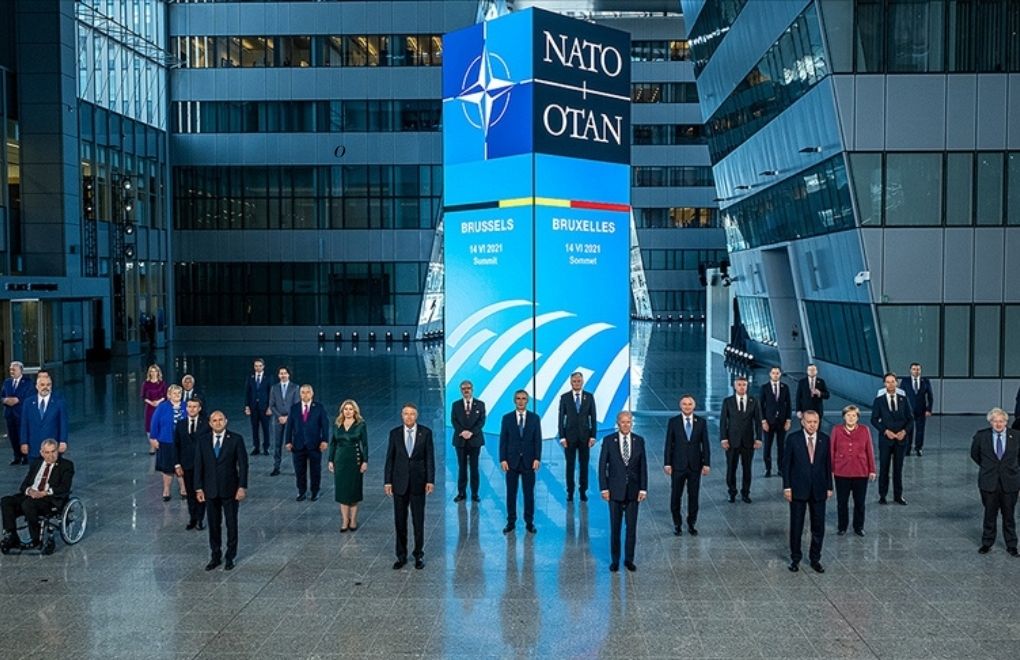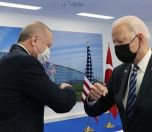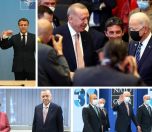* Photo: AA/Brussels
Click to read the article in Turkish
Following the Summit of the Heads of State and Government at the North Atlantic Treaty Organization (NATO) Headquarters in Belgium's capital city of Brussels yesterday (June 14), the leaders have issued a joint declaration, the Brussels Summit Communiqué.
In their 79-article declaration, the Heads of State and Government of the 30 NATO Allies have said, "China's stated ambitions and assertive behaviour present systemic challenges to the rules-based international order and to areas relevant to Alliance security."
The Heads of State and Government also expressed "concerns by those coercive policies which stand in contrast to the fundamental values enshrined in the Washington Treaty," briefly adding the following:
"China is rapidly expanding its nuclear arsenal with more warheads and a larger number of sophisticated delivery systems to establish a nuclear triad. It is opaque in implementing its military modernisation and its publicly declared military-civil fusion strategy.
"It is also cooperating militarily with Russia, including through participation in Russian exercises in the Euro-Atlantic area. We remain concerned with China's frequent lack of transparency and use of disinformation.
"We call on China to uphold its international commitments and to act responsibly in the international system, including in the space, cyber, and maritime domains, in keeping with its role as a major power."
Remarks on Russia and Iran
The joint declaration of the leaders has also referred to the relations with Russia. The leaders have called on "Russia to rescind the designation of the Czech Republic and the US as 'unfriendly countries'."
They have also urged Iran "to stop all ballistic missile activities inconsistent with UNSCR 2231, refrain from destabilising actions, and play a constructive role in fostering regional stability and peace."
In his press statement, NATO Secretary General Jens Stoltenberg has talked about the relations with Russia, briefly saying:
"Our relationship with Russia is at its lowest point since the Cold War. And Moscow's aggressive actions are a threat to our security. NATO remains committed to our dual track approach of defence and dialogue. We will keep our defences strong, while remaining ready to talk."
Details about Turkey: Mentioned 5 times
Turkey has been mentioned five times in the joint declaration of the Heads of State and Government. These are as follows:
Article 52
"Syria retains an inventory of short-range ballistic missiles whose range covers parts of NATO's territory and some of our partners' territories. Syria has used these missiles extensively against its own population. We remain vigilant over missile launches from Syria which could again hit or target Turkey. We continue to monitor and assess ballistic missile threat from Syria.
Article 53
"We call for a nationwide ceasefire and the reauthorisation and expansion of the UN cross-border humanitarian assistance for a period of at least 12 months in order to meet the needs of the Syrian people. We reiterate our appreciation to our Ally Turkey for hosting millions of Syrian refugees.
Article 25
"We continue to reinforce our maritime posture and to protect our sea lines of communication. We welcome the establishment of the NATO Maritime Security Centre of Excellence in Turkey. We will maintain awareness of any potential threats to our critical undersea infrastructure and will continue to address them nationally and, where needed, collectively.
'Contributions to Turkey have increased'
Article 34
"Our assurance measures, including exercises and various other air, land, and maritime activities, remain in place and continue to provide the fundamental baseline requirement for assurance and deterrence. We have increased our contributions to our tailored assurance measures for Turkey, and we remain committed to their full implementation. We have a range of forces, including the Very High Readiness Joint Task Force, which are ready to deploy on short notice to respond to any contingencies and reinforce Allies. The full implementation of NATO's Framework for the South, as an enduring component of NATO's deterrence and defence posture, is ongoing.
Article 43
"NATO BMD [Ballistic Missile Defense] is based on voluntary national contributions, including the US European Phased Adaptive Approach assets in Romania, Turkey, Spain, and Poland, as well as the NATO BMD command and control, the only component eligible for common funding. Additional voluntary national contributions will provide robustness. We are committed to completing additional essential components of NATO BMD command and control, which is necessary for achieving the next major milestone before reaching the Full Operational Capability." (PT/SD)






